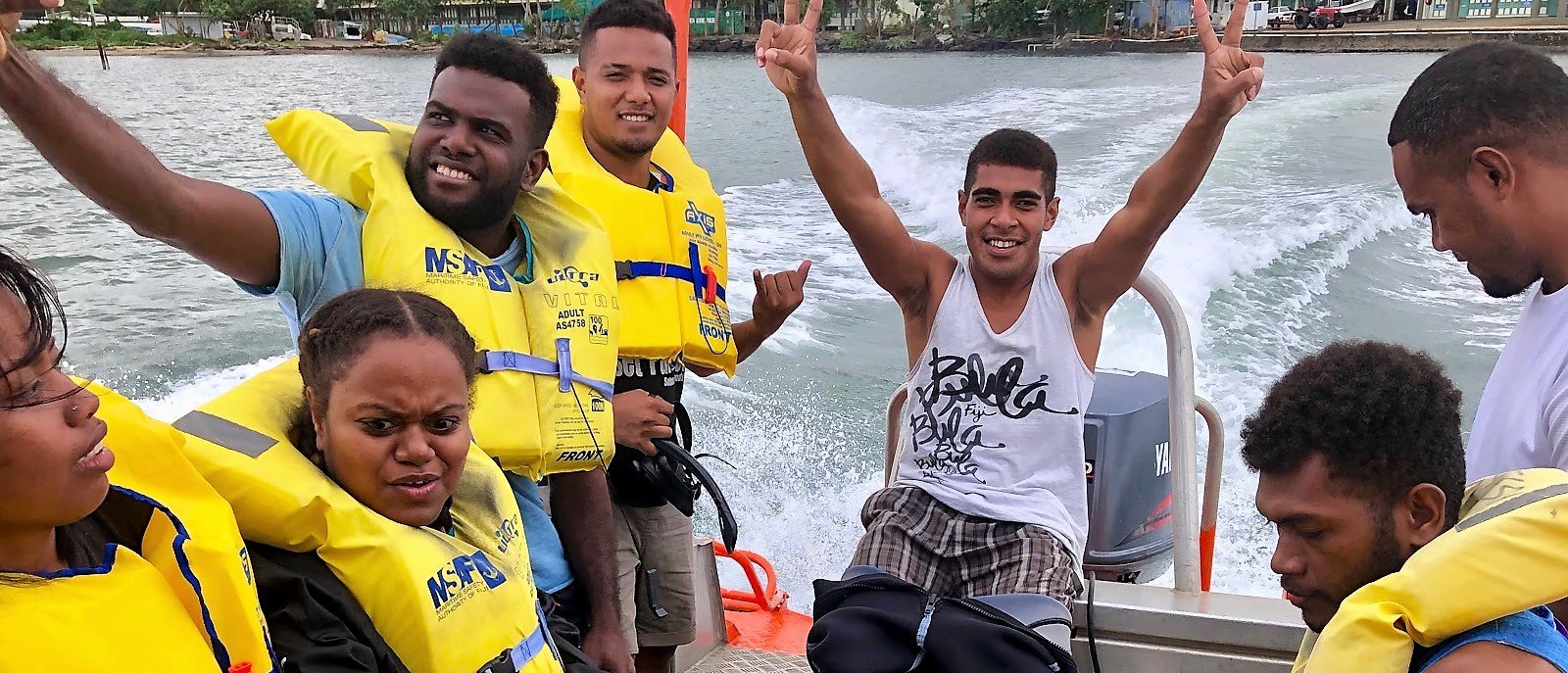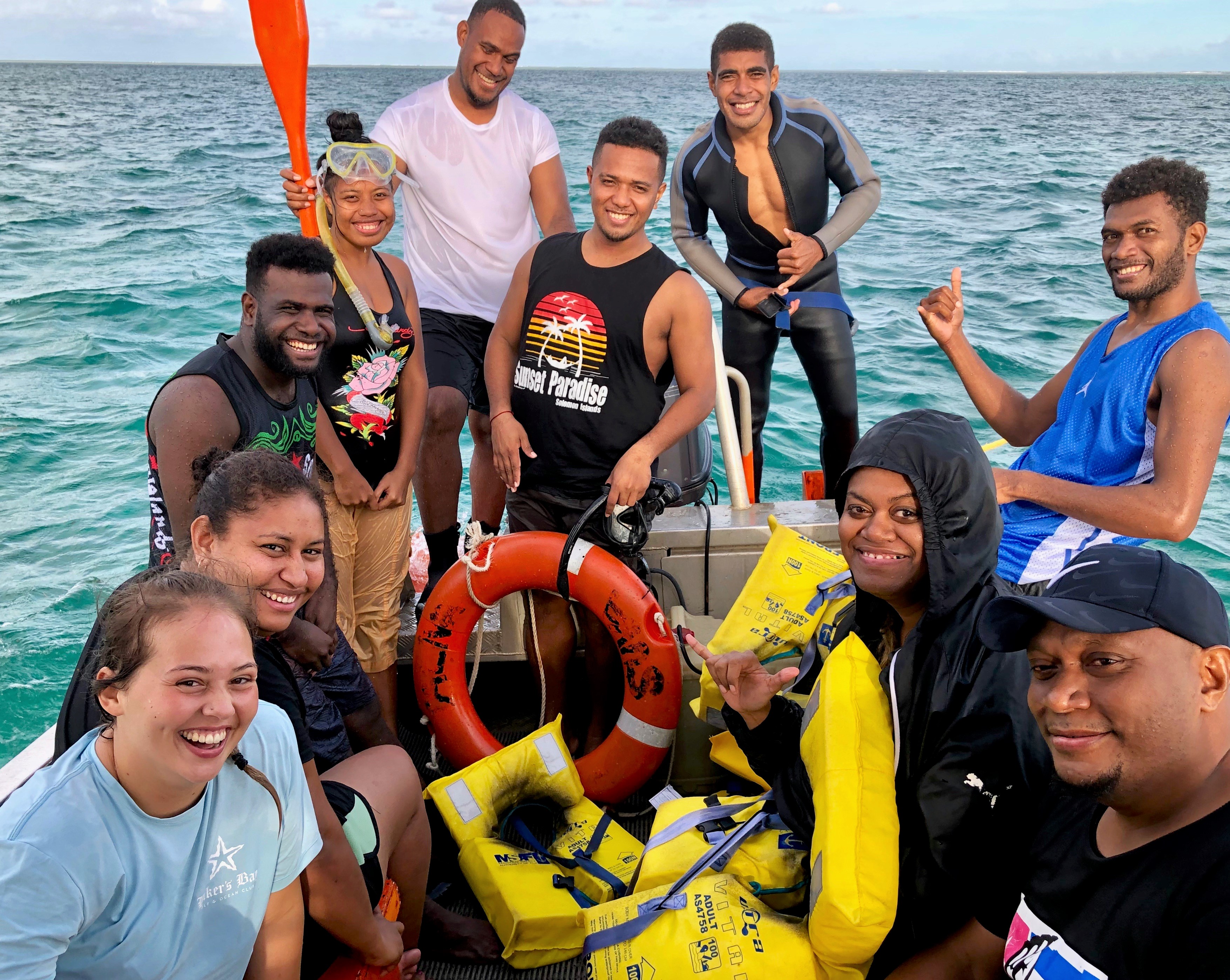Oceans Governance is a 3rd year undergraduate course offered by the School of Marine Studies, USP that complements the 2nd year undergraduate course in “Law of the Sea”. Both courses offered by the School of Marine Studies are designed by the highly regarded fisheries legal expert, Mr Pio Manoa.
Oceans Governance promotes an understanding of how the international legal frameworks fit with national legal and governance frameworks to provide a rules based approach to oceans use. This means that as part of the course there is a detailed look at how the varied uses of the ocean are regulated and how more modern concepts like sustainable development and an eco-systems approach to natural resource management should be taken into account by decision-makers.
Major themes that have arisen throughout the semester include: the importance of consultation and due process for good decision making, legal concepts of sovereignty and sovereign rights, and the importance of the ocean and traditional rights for Pacific Island cultures. Our firm has been fortunate enough to coordinate and teach this Semester's class of 2019 and provide this update relating to the course and their progress that involved contributions from many individuals demonstrating the multi-disciplinary approach required for oceans governance.

The class of 2019 included students from all over the Pacific who all progressed well and during the semester were able to reflect on the multidisciplinary nature of Oceans Governance via regular lectures and tutorials as well as contributions from many esteemed and locally based experts.
The course was assessed via weekly online tests, a formal mid-semester test, essays, a final exam and a major project. The major project asked the students to analyse why a national ocean policy for a Pacific Island jurisdiction is important and a key aspect of this requires the students to design the consultative process to create a national ocean policy.
As part of this students must identify who should be consulted and think through practical and cultural issues that will exist for Pacific Island jurisdictions as they attempt to create and adopt a national ocean policy to guide good decision-making for the oceans that should be accepted by all stakeholders.
This process based approach to oceans governance reflects that the answers to complex questions of governance and resource use must be found via collaboration and consultation as well as recognising and raising awareness of citizen's rights in the oceans.
The course of Oceans Governance is aimed to assist in the creation of much needed “Marine Managers” for the Pacific. The School of Marine Studies succinctly explains the importance of Marine Managers:
“our graduates in Marine Management will have the necessary skills to become good decision makers in government agencies, NGOs, communities and in the private sector to define the political agenda regarding sustainable development and blue growth. Scientists have knowledge by typically limited authority to implement policies. Decision makers have power but generally lack specialised knowledge of the environmental problems or challenges that our oceans and resources are facing. At the SMS we strive to link science with policy making, bringing knowledge and power together to make informed decisions that can drive sustainable development in Pacific Island Countries.”
However, Oceans Governance is a big and challenging topic that is rapidly gaining more recognition as we face the effects of climate change that are unfortunately particularly felt in the Pacific region.
The course itself recognises the importance of, and prepares students to receive, a good understanding of various areas of law and legal frameworks including, but not limited to: international law relating to oceans, how international law and national law fit together, how rights to ocean spaces are created, and concepts like sovereignty and sovereign rights.
Over 14 weeks, lectures and tutorials were delivered in the following areas:
- An introduction to oceans governance and the Pacific perspective including discussion on different types of property ownership, traditional resource management in the Pacific, and introduction to international and national law frameworks, how they fit and systems of governance
- The importance of oceans for all its uses and resources and how it regulates climate and is affected by climate change
- Pacific Island rights in the Pacific ocean, the importance of Pacific culture and the potential loss of sovereignty and sovereign rights due to the effects of climate change and what that could mean for Pacific Island culture
- Good decision making processes that take into account the international and national legal frameworks as well as those whose interests may be adversely affected by the decision and traditional rights holders
- The organs of a nation State, with an emphasis on how legislation is made, implemented and interpreted
- Principles of good decision-making that should follow natural justice, due process and all relevant considerations
- An overview of the Law of the Sea, how it emerged and led to the United Nations Law of the Sea Convention, 1982 (UNCLOS) and how it balances coastal State rights with freedom of the sea and creates areas of sovereignty and sovereign rights and the important differences and implications
- Various uses of the ocean and how they are regulated including:
- Seabed mining
- Fishing including the role of institutions in the management of living resources
- Shipping
- Maritime security and emerging issues
- Traditional resource management in the Pacific and the role and importance of co-management and the concept of “ocean grabbing” what it means and its implications for the Pacific
- Ocean science underpinning ocean governance with an emphasis on the importance of science to inform decision making
- Integrated oceans management and the development of a national ocean policy
- Marine Protected Areas as a tool of integrated management
- Other concepts relating to sustainable development and management based on ecosystem based management
- Alternative governance structures that may be suitable for the Pacific Island context that take into account traditional rights but do not change them.
In addressing the above topics, we were fortunate to be joined by a number of individuals and experts who were essential due to the multidisciplinary nature of Oceans Governance.
These locally based experts provided lectures, tutorials or joined us for group discussions in the following areas:
- Maritime Security - Dr Joeli Veitayaki, Associate Professor of the School of Marine Studies of USP
- Fisheries Management - Mr. Damian Johnson, an Inshore Fisheries Advisor with the Ministry of Fisheries and Mr. Navneel Singh, a Fisheries Officer Policy and Planning with the Inshore Fisheries Management Division, Ministry of Fisheries
- Integrated Oceans Management - a Fiji perspective from the Fiji Environmental Law Association - Mrs Kiji Vukikomoala
- Science underpinning good decision making with a particular emphasis on MPAs - Dr. Stuart Kininmonth, acting head of the School of Marine Studies, USP
- Co-management and traditional rights in nearshore fisheries - Mr Esaroma Ledua, PhD student, School of Marine Studies, USP
- The Locally Managed Marine Area network, the importance of community based management and ocean grabbing in the Pacific - Dr Hugh Govan, Adviser Policy and Advocacy, LMMA network
- Lessons and insights from an oceans governance practitioner - Arthur Sokimi, Oceans Consultant with Oxfam in the Pacific Regional Hub, and part of the alumni of the School of Marine Studies at USP
The above individuals provided their valuable time and ensured that the Oceans Governance class of 2019 that included students from Fiji, Solomon Islands, Vanuatu, Kiribati and the US, will take away with them an enhanced understanding of the integrated and modern approach to good decision making for our oceans.
Most importantly this excellent group of students leave Oceans Governance aware that the solutions for their shared Pacific ocean must be found in the Pacific by Pacific Islanders, who must work with Pacific scientists and decision-makers in accordance with consultative processes. It was also interesting to note that some of the students attended recent meetings with the UN Secretary General armed with questions relating to the consequences of inundation, which, unfortunately they did not get the opportunity to pose.
As Mr. Sokimi explained to them in our recent group discussion the focus for all of them should be to improve the oceans from how they are now. Mr. Sokimi’s analogy was a good Pacific rugby one, as he explained that regardless of the ball they had been thrown to them, whether it was a hospital pass or not, each one of them must now try to do something with the ball and then provide a better pass to the person next in line to receive it.
Finally, all of the students of the course are committed and bright, and grasped the difficult legal and other concepts that they were thrown at them and acquitted themselves well. I would recommend any of them to employers in the region whether those employers are NGOs, government agencies, or part of the private sector.

Oceans governance students enjoying the field trip where the focus was traditional rights and approaches to management
With special thanks to Taholo Kami who kindly agreed to review the best Major Projects provided by the class of 2019
More information on School of Marine Studies, USP:



